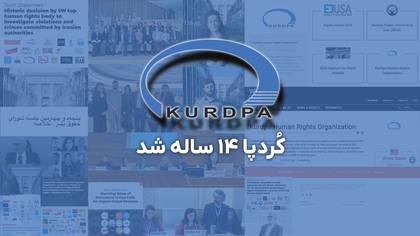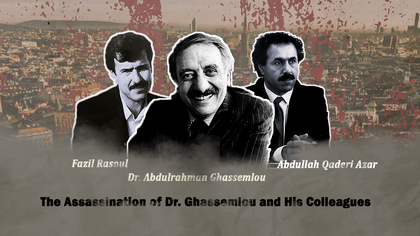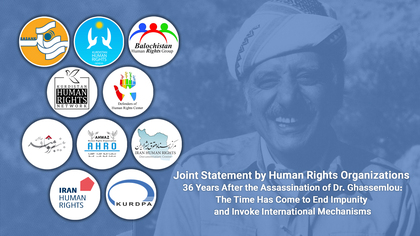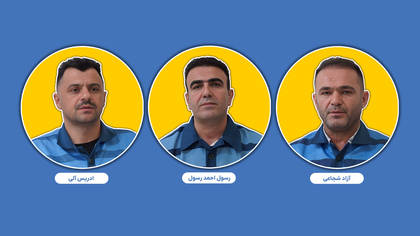'Iran set to expand nuclear activity in bunker'
15:33 - 24 February 2012

KURDPA - Iran is believed to be carrying out preparations to expand nuclear activity deep inside a mountain, diplomats say, in a further sign of defiance in the face of intensifying Western pressure to curb its sensitive uranium enrichment drive.
Increased capacity at the Fordow underground site would probably heighten Western suspicion of Iran\'s intentions, after it last month started refining uranium there to a level that cuts the time it would need for any nuclear weapons bid.
A senior team of the International Atomic Energy Agency (IAEA) failed again this week to get the Islamic state to start addressing their mounting concerns about its nuclear work and returned empty handed to Vienna after two days of talks in Iran.
The setback increased worries about a downward spiral towards conflict between the Islamic Republic and the West, and sent oil prices to a nine-month high.
The UN agency is now putting the finishing touches to its next report on Iran, expected to include information on the Tehran talks as well as more detail on the status of the Fordow plant near the Shi\'ite Muslim holy city of Qom.
\"I think we will see a jump in the potential state of readiness of the facility,\" one Vienna-based envoy said.
Fordow is of particular concern for the West and Israel as Iran is shifting the most controversial aspect of its nuclear work, refining uranium to a level that takes it significantly closer to potential bomb material, to the site.
Estimated to be buried beneath 80 meters (265 feet) of rock and soil, it gives Iran better protection against any Israeli or US military strikes.
Defense Minister Ehud Barak has warned that the Islamic state\'s nuclear research could soon pass into what he called a \"zone of immunity,\" protected from outside disruption.
In a report issued on Thursday, the International Crisis Group think-tank said prospects for a military confrontation erupting in the long-running nuclear row, though still unlikely, appeared \"higher than ever.\"
\"As Israel sees it, the nuclear program represents a serious threat; the time when Iran\'s putative efforts to build a bomb will become immune to a strike is fast approaching; and military action in the near future - perhaps as early as this year - therefore is a real possibility,\" it said.
A Western official said Fordow was a very sensitive issue: \"I\'m not quite sure the Iranians understand they are playing with fire there.\"
Iran last month said it had started to refine uranium to a fissile concentration of 20 percent, compared with the 3.5 percent normally used for nuclear power plants, at Fordow.
Soon afterward, it doubled production capacity to a total of more than 600 uranium enrichment centrifuges at Fordow, diplomats have told Reuters.
Iran now appears to be making preparations for a further increase in the number of the cylindrical machines, spinning at supersonic speeds to increase the concentration of the fissile U-235 isotope, at the facility.
\"They are working towards full installation,\" said another diplomat in the Austrian capital. \"But they are not installed and ready to operate yet.\"
Nuclear bombs require uranium enriched to 90 percent, but Western experts say much of the effort required to get there is already achieved once it reaches 20 percent concentration, shortening the time needed for any nuclear weapons \"break-out\".
\'Iran has yet to decide on whether or not to weaponize nuclear program\'
Olli Heinonen, a former head of safeguards inspections at the UN International Atomic Energy Agency, said he believed its next report would include information about the progress in setting up the required infrastructure for enrichment at Fordow.
But diplomats said they expected Iran to mainly keep using old-generation centrifuges, not the newer and more efficient models which it has tried for several years to develop.
\"I don\'t have any indications that cascades of new machines are ready to be operated,\" one of them said.
Neither Iranian officials nor officials at the Vienna-based IAEA, which regularly inspects Iranian nuclear sites including Fordow, were available for comment.
The United States and its allies say Iran is trying to develop the means to make atomic bombs. The Islamic Republic maintains that its nuclear program is aimed at generating electricity and isotopes for medical treatment.
Iran said last year that it would transfer its highest-grade uranium refinement work to Fordow from an above-ground research and development facility at its main enrichment plant at Natanz, and sharply boost capacity.
It says it will use 20 percent-enriched uranium to convert into fuel for a research reactor making isotopes to treat cancer patients, but Western officials say they doubt Iran has the capability to do that on an industrial scale.
In addition, they say, Fordow\'s capacity - up to 3,000 centrifuges - is too small to produce the fuel needed for nuclear power plants, but ideal for yielding smaller amounts of high-enriched product typical of a nuclear weapons program.
Western officials believe Iran has not yet decided whether it will indeed \"weaponize\" enrichment, but rather is seeking now solely to establish the industrial and scientific capacity to do so if needed for military and security contingencies.
Iran disclosed the existence of Fordow to the IAEA only in September 2009, at least two years after construction began, after learning that Western spy services had detected it.
Source – The Jerusalem Post
Increased capacity at the Fordow underground site would probably heighten Western suspicion of Iran\'s intentions, after it last month started refining uranium there to a level that cuts the time it would need for any nuclear weapons bid.
A senior team of the International Atomic Energy Agency (IAEA) failed again this week to get the Islamic state to start addressing their mounting concerns about its nuclear work and returned empty handed to Vienna after two days of talks in Iran.
The setback increased worries about a downward spiral towards conflict between the Islamic Republic and the West, and sent oil prices to a nine-month high.
The UN agency is now putting the finishing touches to its next report on Iran, expected to include information on the Tehran talks as well as more detail on the status of the Fordow plant near the Shi\'ite Muslim holy city of Qom.
\"I think we will see a jump in the potential state of readiness of the facility,\" one Vienna-based envoy said.
Fordow is of particular concern for the West and Israel as Iran is shifting the most controversial aspect of its nuclear work, refining uranium to a level that takes it significantly closer to potential bomb material, to the site.
Estimated to be buried beneath 80 meters (265 feet) of rock and soil, it gives Iran better protection against any Israeli or US military strikes.
Defense Minister Ehud Barak has warned that the Islamic state\'s nuclear research could soon pass into what he called a \"zone of immunity,\" protected from outside disruption.
In a report issued on Thursday, the International Crisis Group think-tank said prospects for a military confrontation erupting in the long-running nuclear row, though still unlikely, appeared \"higher than ever.\"
\"As Israel sees it, the nuclear program represents a serious threat; the time when Iran\'s putative efforts to build a bomb will become immune to a strike is fast approaching; and military action in the near future - perhaps as early as this year - therefore is a real possibility,\" it said.
A Western official said Fordow was a very sensitive issue: \"I\'m not quite sure the Iranians understand they are playing with fire there.\"
Iran last month said it had started to refine uranium to a fissile concentration of 20 percent, compared with the 3.5 percent normally used for nuclear power plants, at Fordow.
Soon afterward, it doubled production capacity to a total of more than 600 uranium enrichment centrifuges at Fordow, diplomats have told Reuters.
Iran now appears to be making preparations for a further increase in the number of the cylindrical machines, spinning at supersonic speeds to increase the concentration of the fissile U-235 isotope, at the facility.
\"They are working towards full installation,\" said another diplomat in the Austrian capital. \"But they are not installed and ready to operate yet.\"
Nuclear bombs require uranium enriched to 90 percent, but Western experts say much of the effort required to get there is already achieved once it reaches 20 percent concentration, shortening the time needed for any nuclear weapons \"break-out\".
\'Iran has yet to decide on whether or not to weaponize nuclear program\'
Olli Heinonen, a former head of safeguards inspections at the UN International Atomic Energy Agency, said he believed its next report would include information about the progress in setting up the required infrastructure for enrichment at Fordow.
But diplomats said they expected Iran to mainly keep using old-generation centrifuges, not the newer and more efficient models which it has tried for several years to develop.
\"I don\'t have any indications that cascades of new machines are ready to be operated,\" one of them said.
Neither Iranian officials nor officials at the Vienna-based IAEA, which regularly inspects Iranian nuclear sites including Fordow, were available for comment.
The United States and its allies say Iran is trying to develop the means to make atomic bombs. The Islamic Republic maintains that its nuclear program is aimed at generating electricity and isotopes for medical treatment.
Iran said last year that it would transfer its highest-grade uranium refinement work to Fordow from an above-ground research and development facility at its main enrichment plant at Natanz, and sharply boost capacity.
It says it will use 20 percent-enriched uranium to convert into fuel for a research reactor making isotopes to treat cancer patients, but Western officials say they doubt Iran has the capability to do that on an industrial scale.
In addition, they say, Fordow\'s capacity - up to 3,000 centrifuges - is too small to produce the fuel needed for nuclear power plants, but ideal for yielding smaller amounts of high-enriched product typical of a nuclear weapons program.
Western officials believe Iran has not yet decided whether it will indeed \"weaponize\" enrichment, but rather is seeking now solely to establish the industrial and scientific capacity to do so if needed for military and security contingencies.
Iran disclosed the existence of Fordow to the IAEA only in September 2009, at least two years after construction began, after learning that Western spy services had detected it.
Source – The Jerusalem Post



